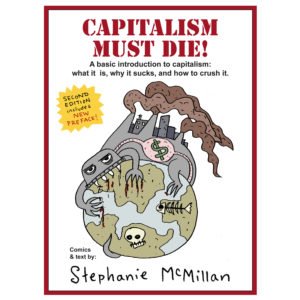Originally published at rabble.ca: http://rabble.ca/books/reviews/2015/09/capitalism-must-die-your-economic-guidebook-to-revolution
Capitalism is so, so terrible. Here are the tools you need to crush it.
September 10, 2015
Capitalism Must Die! A basic introduction to capitalism: what it is, why it sucks, and how to crush it 2nd edition
What is capitalism, how does it work, and why, oh why, is it so terrible? All of these questions, and more, are answered by author Stephanie McMillan in her recent book, Capitalism Must Die! A basic introduction to capitalism: what it is, why it sucks, and how to crush it. McMillan uses her 30 years of experience in organizing against capitalism and her clever cartoons to debunk and deconstruct this destructive practice and create a useful tool readers can put into practice.Aaron Leonard recently corresponded with McMillan about her book, capitalism, cartoons and other matters. This interview has been edited.
***
Some of your images are so playful, yet your message is so serious — how did you arrive at a place of undertaking radical politics through comics?
I loved drawing, and reading comics, ever since I was a kid.
By age 10 I had learned to draw Snoopy by tracing Peanuts, and decided I wanted to be a cartoonist someday. I was in high school during the Reagan years, as the U.S./USSR inter-imperialist struggle was heating up [in the form of the Cold War] to what seemed a very dangerous pitch. I wrote my first article for the school paper, with an accompanying illustration, about the dangers of and need to oppose nuclear weapons.
Then I went to college in New York, studying animation while organizing with the Revolutionary Communist Youth Brigade (RCP) [the youth group of the U.S. Revolutionary Communist Party]. I quickly realized that it was more important to focus on revolutionary change rather than pursue a career for myself, but my father, dying of cancer, asked me to finish school and graduate. After fulfilling my parents’ wishes, I spent the next period of my life organizing, while supporting myself with a succession of temp/clerical, factory and retail jobs.
In the late 1990s, for various reasons, I left the RCP. I still wanted to contribute to the cause of revolution, but now had no organizational framework in which to do that. I thought about how an individual could reach people with ideas and make a social impact. I decided that comics could be an effective vehicle because they are appealing, fast and easy to produce, and can carry a message to a wide audience.
My cartoons evolved through several stages, including traditionally formatted editorial cartoons, gag cartoons, and a sequential narrative comic strip. Recently I was challenged by a comrade to develop a “proletarian conception of cartoons,” and that’s led to a new series of comics that go beyond a critique of capitalism to also assert a working-class alternative. They’re often paired with theoretical and political texts.

